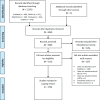Huddles and their effectiveness at the frontlines of clinical care: a scoping review
- PMID: 33559062
- PMCID: PMC8390736
- DOI: 10.1007/s11606-021-06632-9
Huddles and their effectiveness at the frontlines of clinical care: a scoping review
Abstract
Background: Brief, stand-up meetings known as huddles may improve clinical care, but knowledge about huddle implementation and effectiveness at the frontlines is fragmented and setting specific. This work provides a comprehensive overview of huddles used in diverse health care settings, examines the empirical support for huddle effectiveness, and identifies knowledge gaps and opportunities for future research.
Methods: A scoping review was completed by searching the databases PubMed, EBSCOhost, ProQuest, and OvidSP for studies published in English from inception to May 31, 2019. Eligible studies described huddles that (1) took place in a clinical or medical setting providing health care patient services, (2) included frontline staff members, (3) were used to improve care quality, and (4) were studied empirically. Two reviewers independently screened abstracts and full texts; seven reviewers independently abstracted data from full texts.
Results: Of 2,185 identified studies, 158 met inclusion criteria. The majority (67.7%) of studies described huddles used to improve team communication, collaboration, and/or coordination. Huddles positively impacted team process outcomes in 67.7% of studies, including improvements in efficiency, process-based functioning, and communication across clinical roles (64.4%); situational awareness and staff perceptions of safety and safety climate (44.6%); and staff satisfaction and engagement (29.7%). Almost half of studies (44.3%) reported huddles positively impacting clinical care outcomes such as patients receiving timely and/or evidence-based assessments and care (31.4%); decreased medical errors and adverse drug events (24.3%); and decreased rates of other negative outcomes (20.0%).
Discussion: Huddles involving frontline staff are an increasingly prevalent practice across diverse health care settings. Huddles are generally interdisciplinary and aimed at improving team communication, collaboration, and/or coordination. Data from the scoping review point to the effectiveness of huddles at improving work and team process outcomes and indicate the positive impact of huddles can extend beyond processes to include improvements in clinical outcomes.
Study registration: This scoping review was registered with the Open Science Framework on 18 January 2019 ( https://osf.io/bdj2x/ ).
Keywords: communication; cooperative behavior; group processes; patient care teams; quality improvement.
© 2021. This is a U.S. government work and not under copyright protection in the U.S.; foreign copyright protection may apply.
Conflict of interest statement
The authors declare no competing interests.
Figures
References
-
- Glymph DC, Olenick M, Barbera S, et al. Healthcare Utilizing Deliberate Discussion Linking Events (HUDDLE): A Systematic Review. Aana j. 2015;83(3):183–8. - PubMed
-
- Mitchell P, Wynia M, Golden R, et al. Core principles & values of effective team-based health care. 2012. Accessed at Institute of Medicine at http://www.iom.edu/tbc on Dec 10 2018.
-
- Gittell JH. New directions for relational coordination theory. In: Spreitzer GM, Cameron KS, editors. The Oxford handbook of positive organizational scholarship. Oxford: Oxford University Press; 2012. pp. 400–11.
-
- Scoville R, Little K, Rakover J, et al. Sustaining Improvement: IHI White Paper. 2016. Accessed at Institute for Healthcare Improvement at http://www.ihi.org/resources/Pages/IHIWhitePapers/Sustaining-Improvement... on Dec 11 2018.
Publication types
MeSH terms
LinkOut - more resources
Full Text Sources
Other Literature Sources
Medical
Miscellaneous



